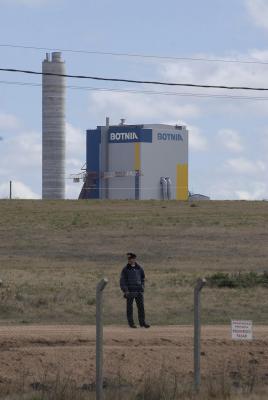Botnia, Smoke Stacks, Progress and...

Produce! Produce! Produce! And consume! consume! consume! That appears to be the formula for today's ever more hungry consumer society. To do so axes chop down forests, mineral rich mountains are lambasted, oil rigs suck "black gold" from its hiding place under the surface of the earth....Mother Nature is stripped to provide the raw materials necessary to produce those glimmering gadgets that excite the whims of avid purchasers from New York or Paris to impoverished slums in the world's under-bellies. In a word, progress at any cost.
True. Some of the gadgets represent significant and even revolutionary advances: computers and internet, high tech medical equipment, digital photography...tons and tons of sun-shine white paper...What is also true is that this head-on production frenzy also inevitably contaminates the environment and threatens world society with irreversible climatic change.
Highly developed capitalistic economies in the United States and Europe need more and more raw materials to satisfy the spiral of demand for industrial gadetry and therefore search the globe for oil, gas, iron...even water. Not a few wars and "preventive invasions" (presented as conflicts in defense of democracy and Western values) are at least in part motivated by the need to secure the supply of raw materials needed to feed factories and cars, etc. in the "First World." Many typically "dirty" factories have begun re-locating in outlying areas not only due to market considerations; popular pressure at home has led them to set up in "Third World" countries where controls are more lax.
In this connection, does anyone really doubt that the new multi-million dollar Botnia paper mill in Fray Bentos will fill the Río de la Plata river with contamination? Let's be frank: the cost of "modernization" is contamination. That means slow but steady destruction of Nature in order to feed the ever-growing demand for raw materials. True, indigenous trees and plants are replaced by fast growing species but that affects the delicate balnce of nature and leads to the destruction of many animal species.
Furthermore, this super-exploitation of natural resources also implies significant cultural and social alterations. For example, the massive planting of soy bean in Argentina--at the expense of native forests--has deprived indigenous tribes of land and the basic ingredients of their diet. Since the industrialization process is dominated by super capitalistic multinational corporations, globalized production has led to by-products such as fast food and imported life styles which have begun to replace traditional habits and customs.
(By the way, even before the multi-million dollar mill went into operation in Uruguay 11 of the firm's workers suffered diverse physical ailments due to over-exposure to chemicals used at the plant, according to the Nov. 13, issue of Página 12. The workers have initiated law suits against the company, but most of the mass media has completely ignored their situation).
Botnia and the Uruguayan government have promised that the latest anti-contamination technology has been incorporated at the plant in Fray Bentos, but the mere size of the operation assures a yet to be determined degree of contamination in the area. Furthermore, if the firm manages to survive political and legal pressures from those who fear the effects of contamination, other similar ventures will certainly pop up in other nearby areas, including Argentina. Operations of this sort are based on long term planning by multi-national interests bent on organizing their operations on a world scale.
In considering the kind of development the consumer society has designed it is important to bear in mind a number of other aspects which have been scantly discussed in the mass media:
º Computers certainly have made offices more efficient. But if you thought they would reduced the amount of paper used, you were way off the track.
º The multinational character of production operates on a big scale and therefore when a decision is made to set up a paper mill in Uruguay, for example, it is merely the first step to a re-edition of the kind of mono-production typical of underdeveloped areas a century or two ago.
º Mass production of industrialized products demands an enormous and ever growing supply of raw materials. In the case of the Finnish Botnia plant, that constitutes an enormous potential threat to native vegetation in the area.
º The vast majority of the products elaborated at Botnia, and those manufactured at similar multinational ventures, are aimed at export to the developed world. The products which multi-national corporations sell domestically inevitably end up with increased price tags for the local population.
º The argument that such ambitious enterprizes provide jobs and income to workers and their families is quite misleading: the ultra-modern technology used is aimed at maximum efficiency and therefore provides employment only to a limited number of hightly skilled workers...
We welcome any comments readers may have on this subject.
0 comentarios